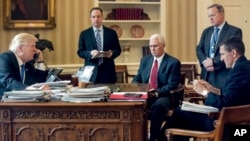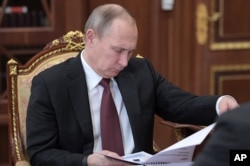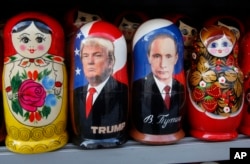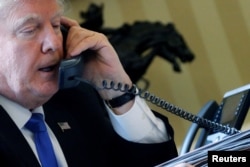Saturday's phone conversation between presidents Donald Trump and Vladimir Putin has raised the hopes of many Russian politicians for a U.S.-Russian rapprochement. But other observers in Moscow remain more cautious about the prospects for bilateral relations in the Trump era.
According to the White House, the two leaders discussed topics ranging from "cooperation in defeating ISIS [Islamic State]to efforts in working together to achieve more peace throughout the world including Syria," in a phone call that was "a significant start to improving the relationship between the United States and Russia that is in need of repair."
The Kremlin said the two presidents "expressed their readiness to make active joint efforts to stabilize and develop Russia-U.S. cooperation on a constructive, equitable and mutually beneficial basis."
It also said they discussed the fight against terrorism, the Middle East, the Arab-Israeli conflict, strategic stability and non-proliferation, Iran's nuclear program, the situation on the Korean Peninsula, and "the main aspects of the Ukrainian crisis."
Trump and Putin called for "real coordination of actions" aimed at "defeating ISIS and other terrorist groups in Syria," and "stressed the importance of rebuilding mutually beneficial trade and economic ties between the two counties' business communities," the Kremlin reported.
Anti-IS coalition
Following the call, Leonid Slutsky, head of the international affairs committee of the State Duma, the lower house of Russia's parliament, said he expects Washington and Moscow to forge a joint fight against Islamic State.
"The next step, I am sure, will be negotiations to create a broad anti-terrorist coalition in Syria, the formation of which the Russian president called for in 2015 from the rostrum of the U.N. General Assembly," Slutsky said.
Slutsky also said he believes that references to economic issues in the conversation between Trump and Putin were a "positive signal for investors and, in general, for the prospects of mending relations between our countries."
No word on sanctions
Some Russian parliamentarians suggested the two presidents intentionally — and rightly — avoided discussing sanctions that the United States imposed on Russia for annexing Crimea and backing separatist rebels in eastern Ukraine.
"For tactical reasons, it was premature to raise the issue of lifting the sanctions in the first conversation," Mikhail Emelyanov, deputy head of the Just Russia party's faction in the Duma, told the Interfax news agency. "I think that in the process of improving Russian-American relations, in the process solving international problems of mutual interest, the issue of sanctions will be resolved of its own accord."
While it is no surprise that leading Russian politicians spoke approvingly of the Trump-Putin phone conversation, some Russian foreign policy experts say it is premature to make favorable forecasts about the future of U.S.-Russian relations.
"It seems to me that neither Putin nor Trump knows what constitutes the crux of the matter in our relations with America," Viktor Kremeniuk, deputy director of the Institute for U.S. and Canadian Studies, told VOA's Russian service. "The fact that we will necessarily cooperate in the fight against ISIS helps us find some common ground. But, in my opinion, it doesn't go beyond that, neither with the Americans, nor with us.
"Trump probably wants expand cooperation with Russia," Kremeniuk added. "But I'm not sure that he has a program for such an expansion, and I'm not sure that what he can offer will appeal to Putin."
Thorny issues remain
Thorny issues like the annexation of Crimea and war in eastern Ukraine are unlikely to continue to "color" the U.S.-Russian relationship, he said, adding that he believes the Trump administration is willing to soften the U.S. position on Crimea.
Andrei Kolesnikov of the Carnegie Moscow Center told VOA's Russian service it is no accident the issue of lifting sanctions was not discussed in the two leaders' phone call.
"The conversation took place amid rumors that Trump had already prepared a draft document on lifting the sanctions, and everyone understandably got worked up, because he was showing that he is strictly carrying out his agenda, from a wall with Mexico to anti-immigrant legislation," he said. "But, apparently, it is precisely with this issue — the issue of lifting sanctions against Russia — that something needs to be coordinated with partners from the EU and the U.K. in general, with partners in the Western world."
He added, "Apparently, [British Prime Minister] Theresa May is not thrilled with this idea, and the EU is clearly strongly against it. Perhaps Trump decided to back off a little bit in this matter, although in the Kremlin's press release there is a phrase, very vague, about the importance of establishing mutually beneficial trade and economic ties."
According to the Kremlin, the two presidents agreed to issue instructions to work out the possible date and venue for a face-to-face meeting.
"There was apparently nothing extraordinary in this conversation," Kolesnikov said. "This is called ‘putting a toe in the water.’ If the water is warm, you can move farther in."







